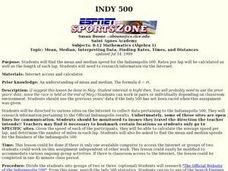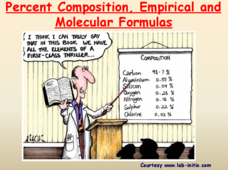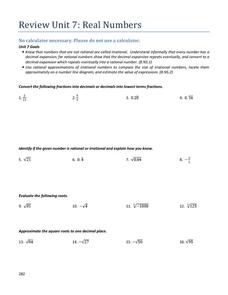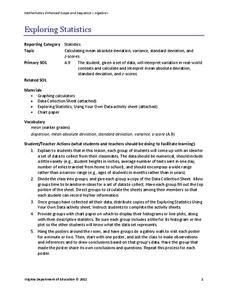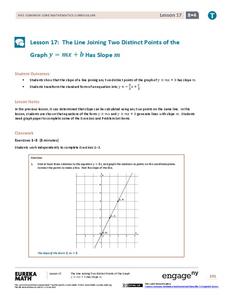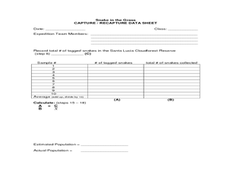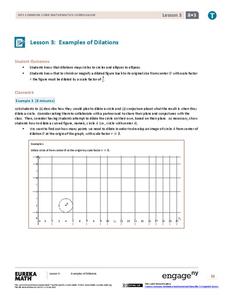EngageNY
Solving General Systems of Linear Equations
Examine the usefulness of matrices when solving linear systems of higher dimensions. The lesson plan asks learners to write and solve systems of linear equations in four and five variables. Using matrices, pupils solve the systems and...
Curated OER
Stadiums in America
Let's play ball! A great springtime activity to learn about ratios. This activity challenges learners to draw stadiums to scale on standard letter paper and also on construction paper. This three-day activity includes a pre-assessment...
Charleston School District
Pre-Test Unit 7: Real Numbers
Don't be irrational! Use this pre-test to assess your classes' ability to work with all types of real numbers. The lesson asks learners to estimate value, evaluate roots, and order numbers. This begins a series of lessons on the real...
Kenan Fellows
Density
Most scholars associate density with floating, but how do scientists determine the exact density of an unknown liquid? The third instructional activity in a seven-part series challenges scholars to find the mass and volume of two unknown...
Curated OER
Indy 500
Start your engines! Small groups collect data from websites pertaining to the Indianapolis 500 in order to determine average speed per lap and miles in each lap. The lesson requires prior knowledge of the the formula d=rt.
Curated OER
How Fast is it Traveling?
Students calculate the rate of speed of various moving objects within the classroom setting, or outside under a controlled environment.
Curated OER
Residential Power System
Perform data analysis on energy consumption to apply algebraic expressions to the real world. Learners will write and solve equations that answer various questions from residential power use. They will collect data at home and calculate...
Curated OER
Volume of Solids: Algebra/Geometry Institute
Use this volume of solids instructional activity to have learners find the surface area and volume of cylinders, pyramids, and prisms. They place cubes inside three-dimensional figures to determine the volume. Worksheets and answers are...
Curated OER
Systems of Equations and Real Life
What a great classroom resource! The intention of this lesson is to show that real-world math can and should be applied to the community in which your students reside. The class relates properties of equations to solving for species...
Science Geek
Percent Composition, Empirical and Molecular Formulas
Help your pupils understand when empirical becomes molecular. The lesson presentation demonstrates the connection between empirical formulas and molecular formulas. Then, given percent composition, the lesson demonstrates the steps to...
National Research Center for Career and Technical Education
Transportation, Distribution, and Logistics: Tire and Wheel Assemblies
Is bigger really better? By the end of this lesson, learners will be able to apply formulas for computing the diameter of tires and wheel assemblies. Begin by showing a slide presentation that will review definitions for radius and...
Charleston School District
Review Unit 7: Real Numbers
Provide pupils with problems to check their understanding of the concepts within the unit. The seven-part series of lessons covers concepts related to irrational numbers. Learners convert between fractions and decimals, estimate the...
Virginia Department of Education
Exploring Statistics
Collect and analyze data to find out something interesting about classmates. Groups devise a statistical question and collect data from their group members. Individuals then create a display of their data and calculate descriptive...
EngageNY
The Line Joining Two Distinct Points of the Graph y=mx+b Has Slope m
Investigate the relationship between the slope-intercept form and the slope of the graph. The lesson plan leads an investigation of the slope-intercept equation of a line and its slope. Pupils realize the slope is the same as the...
Consortium for Ocean Leadership
Measure for Measure
How does your class measure up? Young scientists create a scale drawing of the JOIDES Resolution in a collaborative activity. The lesson incorporates mathematical principles with deep-sea exploration to focus on enhancing measurement...
Curated OER
Converting Between Units
Upper graders practice using measurements by solving conversion problems. There are given different time or measurement increments and must convert them to a larger or smaller increment. They also utilize a calculator and conversion...
Curated OER
Snake in the Grass: Capture/Recapture Activity
Learners estimate the total number of species in Ecuador using the capture/recapture method. They collect data about each species and act as members of a science expedition to determine the total number of species by using mathematical...
Curated OER
Unit 11 Year 5
Apparently unit 11 covers a range of topics related to problem solving, addition, and subtraction. This complete unit presentation is intended for use over a series of days or weeks. It contains numerous visual aids to accompany lessons...
EngageNY
Incredibly Useful Ratios
Start the exploration of trigonometry off right! Pupils build on their understanding of similarity in this lesson that introduces the three trigonometric ratios. They first learn to identify opposite and adjacent sides before exploring...
EngageNY
Examples of Dilations
Does it matter how many points to dilate? The resource presents problems of dilating curved figures. Class members find out that not only do they need to dilate several points but the points need to be distributed about the entire curve...
EngageNY
Comparing Irrational Numbers
Build on your classes' understanding of irrational numbers by comparing their values. The 13th lesson in the 25-part module has individuals estimate values of both perfect and non-perfect roots. They finish by graphing these numbers on a...
EngageNY
Computing Actual Lengths from a Scale Drawing
The original drawing is eight units — how big is the scale drawing? Classmates determine the scale percent between a scale drawing and an object to calculate the length of a portion of the object. They use the percent equation to find...
EngageNY
Describing a Distribution Displayed in a Histogram
The shape of the histogram is also relative. Learners calculate relative frequencies from frequency tables and create relative frequency histograms. The scholars compare the histograms made from frequencies to those made from relative...
Curated OER
Wind Effects on Model Building: Pre-Lab for Truss Design and Testing
Emerging engineers perform pre-lab calculations in this first of a three-part lesson on model building. They determine the forces of tension and compression in a truss. After completion of the worksheet, pupils will draw a draft of their...






